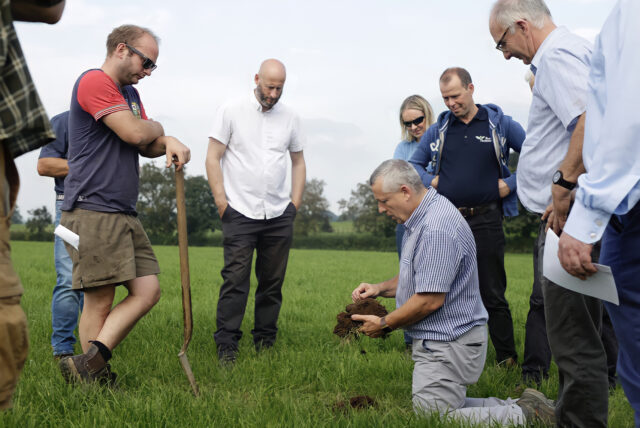Spending (more than) a penny to reduce greenhouse gas emissions

Co-op and Co-op Foundation to fund organisations trialling human urine and seaweed to reduce soy-containing animal feed and synthetic fertilisers in farming
An organisation developing fertiliser from human urine and another which is using seaweed to reduce the need for synthetic fertilisers have both been awarded funding from round two of the Co-op Foundation’s £3.5m Carbon Innovation Fund (CIF) partnership with Co-op.
NPK Recovery, formerly Vandenbergh UK has received £186k to develop a nutrient-rich, environmentally sustainable fertiliser from human urine. The team hopes to eventually create a system that collects waste from festival and event toilets and urinals and processes it to supply local farming communities with this unusual alternative fertiliser.
Meanwhile, Car-Y-Mor/For the Love of the Sea, based in Wales, has received £199k to scale up production of an ocean farm grown seaweed-based biological stimulant. They hope this will allow them to create a product that reduces the need for synthetic fertilisers on farms.
These organisations are just two of seven Carbon Innovation Fund (CIF) partners that are innovating new ways to reduce reliance on soy-containing animal feed and synthetic fertilisers in farming. CIF is the largest environmental partnership between Co-op and its charity, the Co-op Foundation. It’s funded by Co-op donations from the sale of compostable carrier bags in the UK, as well as the Foundation’s own funds.
Other new partners include:
- Farm Carbon Zero CIC, operating as Arc Zero, (Northern Ireland) a collective of seven farmers committed to reaching Net Zero, which has received £98k for its work to improve the sustainability of their farms over the next 3 years, and sharing the knowledge they develop.
- Kent Wildlife Trust (England) which has received £100k to trial test the success of liquid compost to reduce farmers’ reliance on nitrogen-based fertiliser. They are also building a regional farming network to promote regenerative farming.
- Pontus Research Limited (Wales) which has received £200k to create low-carbon, soy-free alternatives to aquaculture feed. They’ll be using sustainable and locally-sourced ingredients
- Scottish Association for Marine Science (SAMS), (Scotland) which has received £199k to research how different forms of marine waste, including shellfish, mollusc shells and seaweed can be repurposed to create new fertilisers.
- WWF-UK (UK) which has received £100k to conduct trials to replace synthetic fertiliser with seaweed fertiliser on arable farms. This will help the team better understand whether seaweed fertiliser could become a commercially viable and environmentally friendly alternative.
This funding is a part of Co-op’s Climate Plan, where the retailer has recognised the current climate emergency and set out a response.
It also builds upon the Foundation’s plan to create more sustainable communities, as part of its new strategy. Round two follows on from £1.4m of grant-giving in round one of the funding partnership.
Nick Crofts, CEO of the Co-op Foundation said:
“We’ve learnt so much through our work with Round One Carbon Innovation Fund partners working to revolutionise food, farming and aquaculture, which has informed this second round of this partnership with Co-op. By focusing on reducing soy-containing animal feed and synthetic fertiliser we are supporting our partners to tackle a real issue in the industry and work towards truly sustainable communities. I can’t wait to see the innovations our Carbon Innovation Fund Round Two partners deliver, and how we can all learn from each other through co-operation and collaboration.”
Adele Balmforth, Director of Propositions at Co-op, said:
“The second round of the Carbon Innovation Fund is a vital part of Co-op’s ambitious pathway to Net-Zero and focus on co-operating for a fairer world. Our new partners are focused on reducing carbon emissions and resilient food systems, which are the biggest challenges that everyone in the food industry is facing. Co-operation is key when tackling these huge issues, and we hope that our partner’s learnings will support innovation that can be scaled to support the wider food industry in the future.”
The Co-op Foundation is Co-op’s charity and it believes co‑operation is at the heart of strong communities. It’s Building communities of the future together’ strategy is helping the team deliver on Co-op’s vision of ‘Co-operating for a fairer world.
Sign up to the Co-op Foundation blog to hear first when new funding is announced.
ENDS
For more information, please contact Sairah Rehman on sairah.rehman@coop.co.uk.